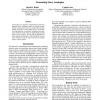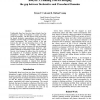139
click to vote
AIIDE
2009
14 years 11 months ago
2009
This paper proposes an Integrated MDP and POMDP Learning AgeNT (IMPLANT) architecture for adaptation in modern games. The modern game world basically involves a human player actin...
153
click to vote
AIIDE
2009
15 years 3 months ago
2009
Developing computer game agents is often a lengthy and expensive undertaking. Detailed domain knowledge and decision-making procedures must be encoded into the agent to achieve re...
122
click to vote
AIIDE
2009
15 years 3 months ago
2009
In this paper, we describe a computational system that generates story analogues based on previous stories. Unlike many previous works on story generation that attempt to produce ...
134
click to vote
AIIDE
2009
15 years 3 months ago
2009
Players perceive information about game environments through a virtual camera. While a significant discussion in the industry and in academic research circles has centered around ...
122
click to vote
AIIDE
2009
15 years 3 months ago
2009
Traditionally, there have been two large obstacles faced in attempting to apply AI techniques to games and other virtual environments. The first obstacle is the gap between the la...
127
click to vote
AIIDE
2009
15 years 3 months ago
2009
Although in theory opponent modeling can be useful in any adversarial domain, in practice it is both difficult to do accurately and to use effectively to improve game play. In thi...
202
click to vote
AIIDE
2009
15 years 3 months ago
2009
We present a case-based reasoning technique for selecting build orders in a real-time strategy game. The case retrieval process generalizes features of the game state and selects ...
157
click to vote
AIIDE
2009
15 years 3 months ago
2009
Design of game worlds is becoming more and more laborintensive because of the increasing demand and complexity of content. This is being partially addressed by developing semi-aut...
135
Voted
AIIDE
2009
15 years 3 months ago
2009
In most modern video games, content (e.g. models, levels, weapons, etc.) shipped with the game is static and unchanging, or at best, randomized within a narrow set of parameters. ...





